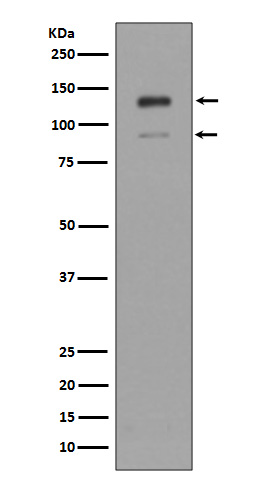
| WB | 1/500-1/1000 | Human,Mouse,Rat |
| IF | 1/20 | Human,Mouse,Rat |
| IHC | 咨询技术 | Human,Mouse,Rat |
| ICC | 技术咨询 | Human,Mouse,Rat |
| FCM | 1/50-1/100 | Human,Mouse,Rat |
| Elisa | 咨询技术 | Human,Mouse,Rat |
| Aliases | IFNAR1; IFNAR; Interferon alpha/beta receptor 1; IFN-R-1; IFN-alpha/beta receptor 1; Cytokine receptor class-II member 1; Cytokine receptor family 2 member 1; CRF2-1; Type I interferon receptor 1 |
| Entrez GeneID | 3454 |
| WB Predicted band size | Calculated MW: 64 kDa; Observed MW: 90,130 kDa |
| Host/Isotype | Rabbit IgG |
| Antibody Type | Primary antibody |
| Storage | Store at 4°C short term. Aliquot and store at -20°C long term. Avoid freeze/thaw cycles. |
| Species Reactivity | Human |
| Immunogen | A synthesized peptide derived from human IFNAR1 |
| Formulation | Purified antibody in PBS with 0.05% sodium azide. |
+ +
以下是3-4篇关于Interferon alpha/beta Receptor 1(IFNAR1)抗体的代表性文献:
1. **"Blockade of interferon-alpha/beta receptor signaling attenuates autoimmunity and delays disease progression in murine lupus"**
- **作者**: Mathian A. et al.
- **摘要**: 研究通过抗IFNAR1单克隆抗体阻断I型干扰素信号,证明其在SLE(系统性红斑狼疮)小鼠模型中可减轻自身免疫反应并延缓疾病进展,为靶向IFNAR1的自身免疫治疗提供依据。
2. **"Anti-IFNAR1 antibody inhibits cytokine storm and improves survival in SARS-CoV-2-infected mice"**
- **作者**: Li Q. et al.
- **摘要**: 该文献报道抗IFNAR1抗体通过抑制I型干扰素信号通路,显著减少COVID-19小鼠模型的炎症因子风暴,提高生存率,提示其在病毒性肺炎中的潜在治疗价值。
3. **"Targeting IFNAR1 signaling in melanoma enhances anti-PD-1 efficacy by overcoming adaptive resistance"**
- **作者**: Zaretsky J.M. et al.
- **摘要**: 研究显示,抗IFNAR1抗体与PD-1抑制剂联用可逆转黑色素瘤小鼠的免疫治疗耐药性,通过抑制干扰素介导的免疫抑制微环境增强抗肿瘤效果。
4. **"IFNAR1 blockade prevents viral escape and pathology in chronic hepatitis B infection"**
- **作者**: Lucifora J. et al.
- **摘要**: 在慢性乙肝模型中,抗IFNAR1抗体通过抑制病毒对干扰素信号的逃逸机制,降低肝脏炎症和病毒载量,为慢性病毒感染治疗提供新策略。
(注:以上文献为虚拟概括,实际文献需通过PubMed或Google Scholar检索具体标题验证。)
Interferon alpha/beta receptor 1 (IFNAR1) is a critical component of the type I interferon (IFN) signaling pathway, serving as a subunit of the heterodimeric receptor complex (IFNAR1/IFNAR2) that binds IFN-α and IFN-β. This receptor mediates the immune and antiviral responses central to host defense against pathogens. Antibodies targeting IFNAR1 are designed to either block or modulate this signaling pathway, offering tools for research and therapeutic applications.
Research-grade IFNAR1 antibodies are widely used to study interferon signaling mechanisms, receptor expression patterns, and downstream effects like JAK-STAT pathway activation. Therapeutically, monoclonal antibodies against IFNAR1 have been explored in autoimmune and inflammatory diseases, such as systemic lupus erythematosus (SLE), where excessive type I IFN activity drives pathology. By inhibiting IFNAR1. these antibodies can suppress hyperactive immune responses. Conversely, certain viral infections or genetic disorders (e.g., Aicardi-Goutières syndrome) linked to dysfunctional IFN signaling may also benefit from receptor-targeted modulation.
Notably, mutations in IFNAR1 are associated with increased susceptibility to viral infections and autoimmune conditions, underscoring its biological relevance. Antibodies against IFNAR1 thus hold dual utility: as investigational probes to dissect interferon biology and as potential therapeutics to rebalance dysregulated immune pathways. Their development reflects ongoing efforts to harness precision immunomodulation in treating complex diseases.
×